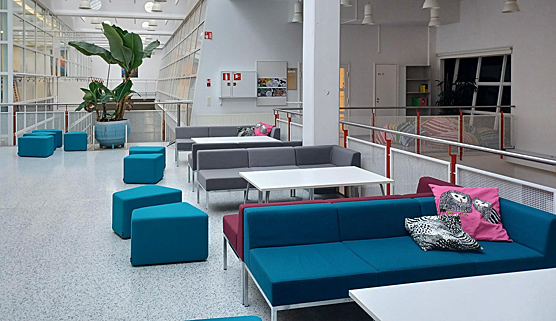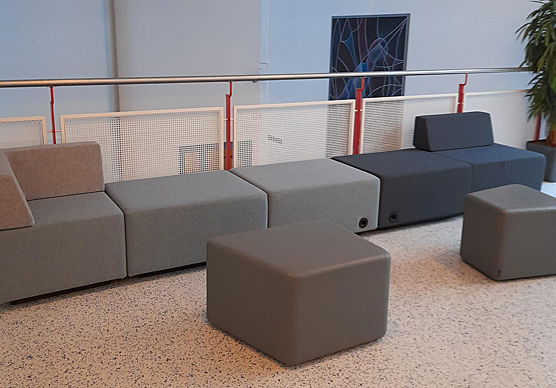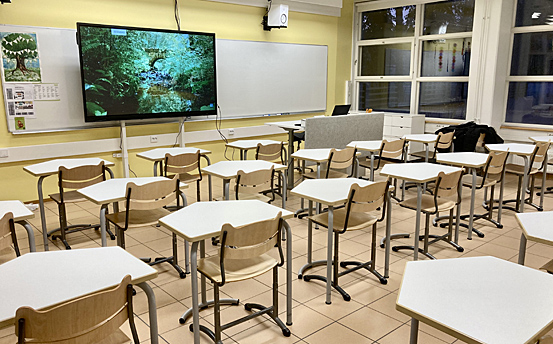
© Jonna Wirèn
The circular economy is part of the City of Lahti's strategy and procurement programme. In 2020, the city signed a framework contract for recycled furniture with three suppliers: OffiStore, Martela and Pa-Ri Materia. At the same time, a framework contract for new furniture is also in place.
"It also mentions the recycling of furniture after decommissioning," says Tarinka Ringvall, Procurement Manager of the City of Lahti. The framework contract defines certain requirements for suppliers. "They must know the background of the recycled furniture so that we can exclude the risk of using the furniture in an environment with indoor problems. In addition, the suppliers commit to maintain and repair the furniture during the warranty period and, if necessary, beyond."
According to Ringvall, surprisingly many of the city's operators have had a high threshold for purchasing second-hand furniture, and the procurement has only started at the end of 2021. "It is therefore important to support the selection of recycled furniture through extensive internal communication to allay quality concerns. It is also important to accept that it is impossible to find out all the information about old recycled furniture, such as the materials or chemicals used in the furniture."
Recycled furniture creates personal spaces in schools
One of the pioneers in the procurement of recycled furniture is the Kukkanen School in Lahti. When the school moved to premises vacated by Rakokivi School in Nastopoli, the premises were furnished almost exclusively with recycled furniture. The credit for this belongs to the school's active staff and head teacher Sanna Ainola.
"We brought in furniture from the old school and also used furniture that had been vacated from other teaching spaces in the city," Ainola says. She says that recycled furniture may not necessarily create a uniform look for the whole school, but on the other hand, teachers have the freedom to furnish their classrooms in a more personal way. "The teachers also had a say in the interior design of the rooms, and the curtains, for example, are made by youth workshops in the city of Lahti."
Nastopoli is not a conventional school building, but open learning environments have been created in former machine halls. The corridors are also open, and in one of them, an activity hall was designed together with the pupils. "At the request of the students, the lobby was equipped with recycled sofas, sack chairs and a second-hand pool table. Through participation, the spaces are also more appreciated."

© Timo Harmaa/Pa-Ri
The functionality of the recycled furniture is no different from the new ones
The recycled furniture for Kukkanen School was supplied by Pa-Ri Materia Oy, which has specialised in the sale of recycled furniture since 1997. The range now also includes new furniture, and when the two are combined, it's called hybrid furniture. "The main goal is to get as long a life cycle as possible for the furniture," says Regional Sales Manager Timo Harmaa.
Kukkanen School received the largest single order of recycled furniture in Pa-Ri's history, including more than 300 desks, furniture for the student activity room, soft furnishings for the teachers' room and meeting and break rooms. The majority of them are quality Martela and EFG furniture up to 3–5 years old. "We also know the history of the furniture in detail. The soft furnishings come from Wärtsilä Corporation's Vaasa office and the desks for students come from the Finnish Defence Forces."

© Piian Kytö
All the recycled furniture sold by Pa-Ri has been found to be in a saleable condition already on receipt. Soft furnishings are at least vacuumed, often washed, and re-upholstered if necessary. Components can also be combined, for example, a chair can be built from several ‘replacement parts’. "However, you won't notice any difference between recycled furniture and new furniture. The functionality is exactly the same."
Most of the furniture supplied to Kukkanen School is still from the same manufacturers, so the choice of recycled products reduced the cost of the furniture purchase by a quarter compared to new purchases. The savings allowed the school to order ergonomic electric desks and saddle chairs for all teachers who wanted them. The environmental savings were at least as significant.
"The Helsinki Metropolitan Area Recycling Centre audited the acquisitions of Kukkanen School, and the use of recycled furniture saved 71,000 kilos of solid natural resources," Timo Harmaa says. Carbon dioxide emissions decreased by 22,500 kg. "This corresponds to an average Finn’s housing emissions over a period of more than 10 years."
More information
- Tarinka Ringvall, Purchasing Manager of the City of Lahti, firstname.lastname@lahti.fi
More on this topic